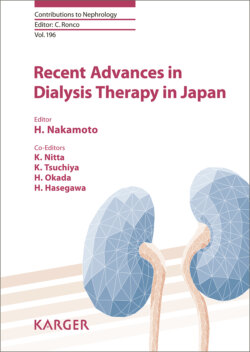Читать книгу Recent Advances in Dialysis Therapy in Japan - Группа авторов - Страница 62
На сайте Литреса книга снята с продажи.
Abstract
ОглавлениеBackground: There is an increasing prevalence of dementia associated with population aging, and anti-dementia measures have now become of increasing importance in Japan. Chronic kidney disease (CKD) is a risk factor for cognitive impairment. Summary: We previously demonstrated that hemodialysis patients have a higher prevalence of brain atrophy, even at younger age, than the general population, and also demonstrated the association between frontal lobe atrophy and frequency of rapid decline in blood pressure during the hemodialysis session. Recently, we demonstrated that decline in gray matter volume in CKD patients on peritoneal dialysis was significantly more rapid compared to non-dialysis-dependent CKD patients, and also showed a close association between gray matter atrophy and executive dysfunction in CKD patients, suggesting the importance of preventing brain atrophy for the prevention of cognitive impairment. Our recent epidemiological study demonstrated that both decreased kidney function and albuminuria were identified as independent risk factors for the development of dementia. In addition, it has been reported that possible contributing factors include anemia, oxidative stress, and the renin-angiotensin system (RAS). Previous reports have demonstrated that CKD patients with severe anemia show cognitive impairment, which was recovered by correction of anemia using erythropoiesis-stimulating agents. Then, we examined the role of oxidative stress and RAS using a mouse model of CKD-associated cognitive impairment, and demonstrated that the RAS inhibitor candesartan, as well as the antioxidant tempol, inhibited the development of cognitive impairment through inhibition of oxidative stress in the hippocampus. Key Messages: In CKD patients, progression of brain atrophy is more rapid and cognitive impairment is more common than in non-CKD subjects. Oxidative stress and RAS in the brain are associated with CKD-associated cognitive impairment.
© 2018 S. Karger AG, Basel
In Japan, where the aging population is a concern, there is an increasing prevalence of dementia associated with population aging. Anti-dementia measures have thus become of increasing importance. Aging is also associated with increasing risk of chronic kidney disease (CKD), which itself is a known risk factor for dementia. Therefore, addressing both CKD and cognitive impairment is an important ongoing task in Japan. This article reviews the relationships of CKD with brain atrophy and cognitive impairment, the factors associated with cognitive impairment, and the mechanism of cognitive impairment in CKD with a focus on our studies.
